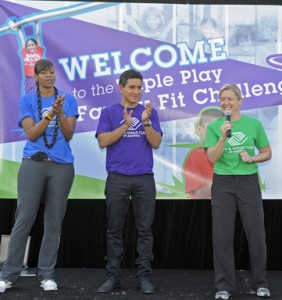November 19th, 2012 by Dr. Val Jones in Announcements
No Comments »

Tina Thompson, Mario Lopez, Dr. Val Jones
The Boys & Girls Clubs of America (BGCA) are about to kick off their annual Fit Family Challenge. The goal is to support families as they commit to a lifestyle of healthy diet, regular exercise, and strong moral qualities. It’s called the “Triple Play” approach – a game plan for body, mind, and soul. I’m honored to be their “mind” coach again this year, and will help to shepherd 250 BGCA families from across the country. Five finalists will be chosen to compete in Los Angeles for the title of fittest family near the end of 2012. We have timed the competition to coincide with New Year’s Resolution planning, and hope that these fit families will inspire others to turn over a new leaf in 2013.
As part of my support for the competition, I’ll be publishing several blog posts (at Better Health and the Fit Family Challenge Blog) with evidence-based healthy eating tips for the families – and for anyone who wants to follow along with the Triple Play Fit Family Challenge. I can’t wait to see how lives will change – and how together we can tip the scales against obesity, disease, and unhealthy relationships. Please join the Boys & Girls Clubs in this important initiative.
November 5th, 2011 by MuinKhouryMDPhD in Opinion, Research
No Comments »


The popular proverbial saying “you cannot have your cake and eat it too” implies that one cannot consume something and preserve it at the same time–in other words, we cannot have it both ways. Well, for once, maybe we can have our cake–our whole genome sequence (WGS)–and eat it too. I believe having our WGS and consuming it in small bite sizes over a lifetime may be the only way to integrate it into medicine and public health.
Rapid advances in genomic sequencing technologies are making the possibility of reliable and affordable whole genome sequencing (WGS) a reality in the next few years. We all carry about 6 billion base pairs of DNA in each of our cells, with 5-10 million inherited variants that are different among us. This genetic variation along with environmental influences provides a blueprint for health throughout the life span, and is related to virtually every disease of public health significance. There is definite interest among the public and scientists about the personal utility of this information. In a recent survey by Nature, attitudes towards genome sequencing were explored among a sample dominated by scientists and professionals from medicine and public health. Although only 18.2% of respondents had had their genome sequenced or analyzed, 2/3 of those who had not reported they would take the opportunity should it arise. Curiosity was reported as the main single factor influencing respondents.
Can this information be useful today in improving medical care and preventing disease? Read more »
*This blog post was originally published at Genomics and Health Impact Blog*
November 2nd, 2011 by RamonaBatesMD in Research
1 Comment »

I happened to see this press release from American Society of Nephrology via Eurekalert regarding an article in an upcoming issue of the Clinical Journal of the American Society Nephrology (CJASN) advocating the safety of kidney donation in individuals over 70 years old. The press release does note that kidneys from these elderly donors do not last as long as those from younger living donors.
Currently, as noted on the University of Maryland Medical Center website:
Donors need to be between the ages of 18 and early 70s and can include parents, children, siblings, other relatives, and friends. An ideal donor should have a genuine interest in donating and a compatible blood type with the recipient.
Donors should be in good general health. Donors do not need to be Read more »
*This blog post was originally published at Suture for a Living*
October 25th, 2011 by GruntDoc in News
2 Comments »

Wow, that is awful beyond belief.
Army seeking troops bitten by stray animals following rabies death – Army – Stripes.
SEOUL – The Army is redoubling its search for anyone who might have been bitten by a wild animal in Iraq or Afghanistan following the Aug. 31 death of a soldier from rabies, the service’s public health command stated Wednesday.
…
“The death of this soldier is very tragic, and we are taking actions to Read more »
*This blog post was originally published at GruntDoc*
October 6th, 2011 by GarySchwitzer in News, Opinion
1 Comment »

Some breast cancer voices raise questions about simply raising “awareness” about breast cancer in October.
Some of them believe that raising awareness about screening, for example, should not be the only message or even the main message of the month.
 Katherine O’Brien, who has metastatic breast cancer (MBC), and who publishes the ihatebreastcancer blog refers to being caught in “October’s pink undertow.”
Katherine O’Brien, who has metastatic breast cancer (MBC), and who publishes the ihatebreastcancer blog refers to being caught in “October’s pink undertow.”
Plunked down in the middle of breast cancer awareness month is National Metastatic Breast Cancer Awareness Day on October 13.
O’Brien says that people like her with MBC have different concerns from those with early stage cancer. She wrote to me: “The day is not about general cancer awareness; it’s about acknowledging the distinct needs of people who have the advanced, incurable form of breast cancer.
She quotes Ellen Moskowitz, past president of the Metastatic Breast Cancer Network (MBCN): Read more »
*This blog post was originally published at Gary Schwitzer's HealthNewsReview Blog*








 Katherine O’Brien, who has metastatic breast cancer (MBC), and who publishes the
Katherine O’Brien, who has metastatic breast cancer (MBC), and who publishes the 







